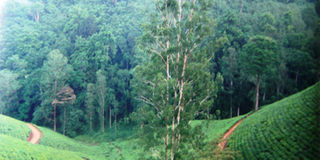Forest stakeholders urged to preserve natural resources, enhance forest production

What you need to know:
- Speaking at the climax of a Mama Misitu campaign yesterday, director of forestry and beekeeping in the Ministry of Natural Resources and Tourism Seleboni John said the government in collaboration with non-government institutions had been fighting to eradicate illegal logging and other forest products.
The government has urged forest stakeholders to put more efforts into preserving natural resources and enhance earnings through forest production.
Speaking at the climax of a Mama Misitu campaign yesterday, director of forestry and beekeeping in the Ministry of Natural Resources and Tourism Seleboni John said the government in collaboration with non-government institutions had been fighting to eradicate illegal logging and other forest products.
“The ministry is still synergising conservation efforts by involving different stakeholders, including Mama Misitu to improve skills and generate opportunities to provide assistance and services to communities and districts,” he said.
He added that, since the 1980s Tanzania had initiated policy and institutional reforms to enhance the performance of economy and it had opened doors for the private sector to participate in forest preservation.
“The core function of the forest and beekeeping division is to oversee, monitor and implement forest policy and regulatory instruments to enhance coordination of research in forestry,” he noted.
Chairperson of the Tanzania Natural Resources Forum (TNRF), Dr Suma Kaare said the Mama Misitu campaign (MMC) was a communications initiative aiming at improving the governance of Tanzania’s forestry by reducing illegal forest harvesting.
The MMC has been conducted in phases since 2012 under the sponsorship of the government of Finland and other forest stakeholders.
“The Mama Misitu campaign came into existence in response to TRAFFIC’s 2007 report on illegal logging in Southern Tanzania. This was a special report that unveiled several key issues, including revenue shortfalls, large-scale corruption and unsustainable rates of harvesting and loss of biodiversity,” she said.
“Through some of the recommendations the stakeholders from MMC started a strong campaign to create public awareness about the importance of forests,” she noted.
For his part, a representative from the Embassy of Finland, Mr William Nambiza, said the Mama Misutu project couldn’t be successful without collaboration with other forest stakeholders in the country.
He said a participatory forest management approach had created a conducive environment for communities to benefit from forest resources.
“The campaign has enabled different stakeholders to come together and have collective decision-making on their resources towards good preservation of natural resources,” he noted.
He said the campaign had also influenced positive attitude and behavioural change among political leaders, foresters, traders and community members on conservation and management of natural forest.




